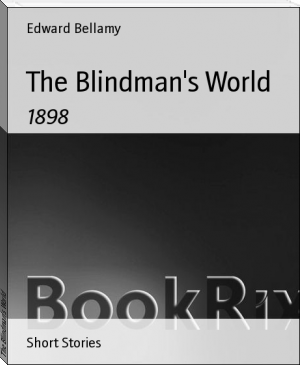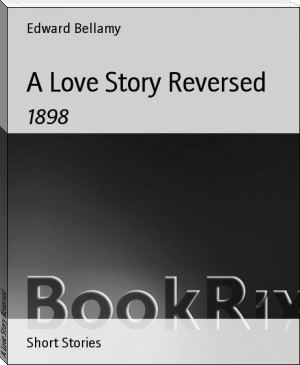The Blindman's World - Edward Bellamy (android e book reader .TXT) 📗

- Author: Edward Bellamy
Book online «The Blindman's World - Edward Bellamy (android e book reader .TXT) 📗». Author Edward Bellamy
known at all to us, and would be counted blasphemous. Moreover, as I have said, our foresight is limited to our lives on this planet. Any speculation beyond them would be purely conjectural, and our minds are repelled by the slightest taint of uncertainty. To us the conjectural and the unthinkable may be called almost the same."
"But even if you do not fear death for itself," I said, "you have hearts to break. Is there no pain when the ties of love are sundered?"
"Love and death are not foes on our planet," was the reply. "There are no tears by the bedsides of our dying. The same beneficent law which makes it so easy for us to give up life forbids us to mourn the friends we leave, or them to mourn us. With you, it is the intercourse you have had with friends that is the source of your tenderness for them. With us, it is the anticipation of the intercourse we shall enjoy which is the foundation of fondness. As our friends vanish from our future with the approach of their death, the effect on our thoughts and affections is as it would be with you if you forgot them by lapse of time. As our dying friends grow more and more indifferent to us, we, by operation of the same law of our nature, become indifferent to them, till at the last we are scarcely more than kindly and sympathetic watchers about the beds of those who regard us equally without keen emotions. So at last God gently unwinds instead of breaking the bands that bind our hearts together, and makes death as painless to the surviving as to the dying. Relations meant to produce our happiness are not the means also of torturing us, as with you. Love means joy, and that alone, to us, instead of blessing our lives for a while only to desolate them later on, compelling us to pay with a distinct and separate pang for every thrill of tenderness, exacting a tear for every smile."
"There are other partings than those of death. Are these, too, without sorrow for you?" I asked.
"Assuredly," was the reply. "Can you not see that so it must needs be with beings freed by foresight from the disease of memory? All the sorrow of parting, as of dying, comes with you from the backward vision which precludes you from beholding your happiness till it is past. Suppose your life destined to be blessed by a happy friendship. If you could know it beforehand, it would be a joyous expectation, brightening the intervening years and cheering you as you traversed desolate periods. But no; not till you meet the one who is to be your friend do you know of him. Nor do you guess even then what he is to be to you, that you may embrace him at first sight. Your meeting is cold and indifferent. It is long before the fire is fairly kindled between you, and then it is already time for parting. Now, indeed, the fire burns well, but henceforth it must consume your heart. Not till they are dead or gone do you fully realize how dear your friends were and how sweet was their companionship. But we--we see our friends afar off coming to meet us, smiling already in our eyes, years before our ways meet. We greet them at first meeting, not coldly, not uncertainly, but with exultant kisses, in an ecstasy of joy. They enter at once into the full possession of hearts long warmed and lighted for them. We meet with that delirium of tenderness with which you part. And when to us at last the time of parting comes, it only means that we are to contribute to each other's happiness no longer. We are not doomed, like you, in parting, to take away with us the delight we brought our friends, leaving the ache of bereavement in its place, so that their last state is worse than their first. Parting here is like meeting with you, calm and unimpassioned. The joys of anticipation and possession are the only food of love with us, and therefore Love always wears a smiling face. With you he feeds on dead joys, past happiness, which are likewise the sustenance of sorrow. No wonder love and sorrow are so much alike on Earth. It is a common saying among us that, were it not for the spectacle of the Earth, the rest of the worlds would be unable to appreciate the goodness of God to them; and who can say that this is not the reason the piteous sight is set before us?"
"You have told me marvelous things," I said, after I had reflected. "It is, indeed, but reasonable that such a race as yours should look down with wondering pity on the Earth. And yet, before I grant so much, I want to ask you one question. There is known in our world a certain sweet madness, under the influence of which we forget all that is untoward in our lot, and would not change it for a god's. So far is this sweet madness regarded by men as a compensation, and more than a compensation, for all their miseries that if you know not love as we know it, if this loss be the price you have paid for your divine foresight, we think ourselves more favored of God than you. Confess that love, with its reserves, its surprises, its mysteries, its revelations, is necessarily incompatible with a foresight which weighs and measures every experience in advance."
"Of love's surprises we certainly know nothing," was the reply. "It is believed by our philosophers that the slightest surprise would kill beings of our constitution like lightning; though of course this is merely theory, for it is only by the study of Earthly conditions that we are able to form an idea of what surprise is like. Your power to endure the constant buffetings of the unexpected is a matter of supreme amazement to us; nor, according to our ideas, is there any difference between what you call pleasant and painful surprises. You see, then, that we cannot envy you these surprises of love which you find so sweet, for to us they would be fatal. For the rest, there is no form of happiness which foresight is so well calculated to enhance as that of love. Let me explain to you how this befalls. As the growing boy begins to be sensible of the charms of woman, he finds himself, as I dare say it is with you, preferring some type of face and form to others. He dreams oftenest of fair hair, or may be of dark, of blue eyes or brown. As the years go on, his fancy, brooding over what seems to it the best and loveliest of every type, is constantly adding to this dream-face, this shadowy form, traits and lineaments, hues and contours, till at last the picture is complete, and he becomes aware that on his heart thus subtly has been depicted the likeness of the maiden destined for his arms.
"It may be years before he is to see her, but now begins with him one of the sweetest offices of love, one to you unknown. Youth on Earth is a stormy period of passion, chafing in restraint or rioting in excess. But the very passion whose awaking makes this time so critical with you is here a reforming and educating influence, to whose gentle and potent sway we gladly confide our children. The temptations which lead your young men astray have no hold on a youth of our happy planet. He hoards the treasures of his heart for its coming mistress. Of her alone he thinks, and to her all his vows are made. The thought of license would be treasop to his sovereign lady, whose right to all the revenues of his being he joyfully owns. To rob her, to abate her high prerogatives, would be to impoverish, to insult, himself; for she is to be his, and her honor, her glory, are his own. Through all this time that he dreams of her by night and day, the exquisite reward of his devotion is the knowledge that she is aware of him as he of her, and that in the inmost shrine of a maiden heart his image is set up to receive the incense of a tenderness that needs not to restrain itself through fear of possible cross or separation.
"In due time their converging lives come together. The lovers meet, gaze a moment into each other's eyes, then throw themselves each on the other's breast. The maiden has all the charms that ever stirred the blood of an Earthly lover, but there is another glamour over her which the eyes of Earthly lovers are shut to,--the glamour of the future. In the blushing girl her lover sees the fond and faithful wife, in the blithe maiden the patient, pain-consecrated mother. On the virgin's breast he beholds his children. He is prescient, even as his lips take the first-fruits of hers, of the future years during which she is to be his companion, his ever-present solace, his chief portion of God's goodness. We have read some of your romances describing love as you know it on Earth, and I must confess, my friend, we find them very dull.
"I hope," he added, as I did not at once speak, "that I shall not offend you by saying we find them also objectionable. Your literature possesses in general an interest for us in the picture it presents of the curiously inverted life which the lack of foresight compels you to lead. It is a study especially prized for the development of the imagination, on account of the difficulty of conceiving conditions so opposed to those of intelligent beings in general. But our women do not read your romances. The notion that a man or woman should, ever conceive the idea of marrying a person other than the one whose husband or wife he or she is destined to be is profoundly shocking to our habits of thought. No doubt you will say that such instances are rare among you, but if your novels are faithful pictures of your life, they are at least not unknown. That these situations are inevitable under the conditions of earthly life we are well aware, and judge you accordingly; but it is needless that the minds of our maidens should be pained by the knowledge that there anywhere exists a world where such travesties upon the sacredness of marriage are possible.
"There is, however, another reason why we discourage the use of your books by our young people, and that is the profound effect of sadness, to a race accustomed to view all things in the morning glow of the future, of a literature written in the past tense and relating exclusively to things that are ended."
"And how do you write of things that are past except in the past tense?" I asked.
"We write of the past when it is still the future, and of course in the future tense," was the reply. "If our historians were to wait till after the events to describe them, not alone would nobody care to read about things already done, but the histories themselves would probably be inaccurate; for memory, as I have said, is a very slightly developed faculty with us, and quite too indistinct to be trustworthy. Should the Earth ever establish communication with us, you will find our histories of interest; for our planet, being smaller, cooled and was peopled ages before yours, and our astronomical records contain minute accounts of the Earth from the time it was a fluid mass. Your geologists and biologists may
"But even if you do not fear death for itself," I said, "you have hearts to break. Is there no pain when the ties of love are sundered?"
"Love and death are not foes on our planet," was the reply. "There are no tears by the bedsides of our dying. The same beneficent law which makes it so easy for us to give up life forbids us to mourn the friends we leave, or them to mourn us. With you, it is the intercourse you have had with friends that is the source of your tenderness for them. With us, it is the anticipation of the intercourse we shall enjoy which is the foundation of fondness. As our friends vanish from our future with the approach of their death, the effect on our thoughts and affections is as it would be with you if you forgot them by lapse of time. As our dying friends grow more and more indifferent to us, we, by operation of the same law of our nature, become indifferent to them, till at the last we are scarcely more than kindly and sympathetic watchers about the beds of those who regard us equally without keen emotions. So at last God gently unwinds instead of breaking the bands that bind our hearts together, and makes death as painless to the surviving as to the dying. Relations meant to produce our happiness are not the means also of torturing us, as with you. Love means joy, and that alone, to us, instead of blessing our lives for a while only to desolate them later on, compelling us to pay with a distinct and separate pang for every thrill of tenderness, exacting a tear for every smile."
"There are other partings than those of death. Are these, too, without sorrow for you?" I asked.
"Assuredly," was the reply. "Can you not see that so it must needs be with beings freed by foresight from the disease of memory? All the sorrow of parting, as of dying, comes with you from the backward vision which precludes you from beholding your happiness till it is past. Suppose your life destined to be blessed by a happy friendship. If you could know it beforehand, it would be a joyous expectation, brightening the intervening years and cheering you as you traversed desolate periods. But no; not till you meet the one who is to be your friend do you know of him. Nor do you guess even then what he is to be to you, that you may embrace him at first sight. Your meeting is cold and indifferent. It is long before the fire is fairly kindled between you, and then it is already time for parting. Now, indeed, the fire burns well, but henceforth it must consume your heart. Not till they are dead or gone do you fully realize how dear your friends were and how sweet was their companionship. But we--we see our friends afar off coming to meet us, smiling already in our eyes, years before our ways meet. We greet them at first meeting, not coldly, not uncertainly, but with exultant kisses, in an ecstasy of joy. They enter at once into the full possession of hearts long warmed and lighted for them. We meet with that delirium of tenderness with which you part. And when to us at last the time of parting comes, it only means that we are to contribute to each other's happiness no longer. We are not doomed, like you, in parting, to take away with us the delight we brought our friends, leaving the ache of bereavement in its place, so that their last state is worse than their first. Parting here is like meeting with you, calm and unimpassioned. The joys of anticipation and possession are the only food of love with us, and therefore Love always wears a smiling face. With you he feeds on dead joys, past happiness, which are likewise the sustenance of sorrow. No wonder love and sorrow are so much alike on Earth. It is a common saying among us that, were it not for the spectacle of the Earth, the rest of the worlds would be unable to appreciate the goodness of God to them; and who can say that this is not the reason the piteous sight is set before us?"
"You have told me marvelous things," I said, after I had reflected. "It is, indeed, but reasonable that such a race as yours should look down with wondering pity on the Earth. And yet, before I grant so much, I want to ask you one question. There is known in our world a certain sweet madness, under the influence of which we forget all that is untoward in our lot, and would not change it for a god's. So far is this sweet madness regarded by men as a compensation, and more than a compensation, for all their miseries that if you know not love as we know it, if this loss be the price you have paid for your divine foresight, we think ourselves more favored of God than you. Confess that love, with its reserves, its surprises, its mysteries, its revelations, is necessarily incompatible with a foresight which weighs and measures every experience in advance."
"Of love's surprises we certainly know nothing," was the reply. "It is believed by our philosophers that the slightest surprise would kill beings of our constitution like lightning; though of course this is merely theory, for it is only by the study of Earthly conditions that we are able to form an idea of what surprise is like. Your power to endure the constant buffetings of the unexpected is a matter of supreme amazement to us; nor, according to our ideas, is there any difference between what you call pleasant and painful surprises. You see, then, that we cannot envy you these surprises of love which you find so sweet, for to us they would be fatal. For the rest, there is no form of happiness which foresight is so well calculated to enhance as that of love. Let me explain to you how this befalls. As the growing boy begins to be sensible of the charms of woman, he finds himself, as I dare say it is with you, preferring some type of face and form to others. He dreams oftenest of fair hair, or may be of dark, of blue eyes or brown. As the years go on, his fancy, brooding over what seems to it the best and loveliest of every type, is constantly adding to this dream-face, this shadowy form, traits and lineaments, hues and contours, till at last the picture is complete, and he becomes aware that on his heart thus subtly has been depicted the likeness of the maiden destined for his arms.
"It may be years before he is to see her, but now begins with him one of the sweetest offices of love, one to you unknown. Youth on Earth is a stormy period of passion, chafing in restraint or rioting in excess. But the very passion whose awaking makes this time so critical with you is here a reforming and educating influence, to whose gentle and potent sway we gladly confide our children. The temptations which lead your young men astray have no hold on a youth of our happy planet. He hoards the treasures of his heart for its coming mistress. Of her alone he thinks, and to her all his vows are made. The thought of license would be treasop to his sovereign lady, whose right to all the revenues of his being he joyfully owns. To rob her, to abate her high prerogatives, would be to impoverish, to insult, himself; for she is to be his, and her honor, her glory, are his own. Through all this time that he dreams of her by night and day, the exquisite reward of his devotion is the knowledge that she is aware of him as he of her, and that in the inmost shrine of a maiden heart his image is set up to receive the incense of a tenderness that needs not to restrain itself through fear of possible cross or separation.
"In due time their converging lives come together. The lovers meet, gaze a moment into each other's eyes, then throw themselves each on the other's breast. The maiden has all the charms that ever stirred the blood of an Earthly lover, but there is another glamour over her which the eyes of Earthly lovers are shut to,--the glamour of the future. In the blushing girl her lover sees the fond and faithful wife, in the blithe maiden the patient, pain-consecrated mother. On the virgin's breast he beholds his children. He is prescient, even as his lips take the first-fruits of hers, of the future years during which she is to be his companion, his ever-present solace, his chief portion of God's goodness. We have read some of your romances describing love as you know it on Earth, and I must confess, my friend, we find them very dull.
"I hope," he added, as I did not at once speak, "that I shall not offend you by saying we find them also objectionable. Your literature possesses in general an interest for us in the picture it presents of the curiously inverted life which the lack of foresight compels you to lead. It is a study especially prized for the development of the imagination, on account of the difficulty of conceiving conditions so opposed to those of intelligent beings in general. But our women do not read your romances. The notion that a man or woman should, ever conceive the idea of marrying a person other than the one whose husband or wife he or she is destined to be is profoundly shocking to our habits of thought. No doubt you will say that such instances are rare among you, but if your novels are faithful pictures of your life, they are at least not unknown. That these situations are inevitable under the conditions of earthly life we are well aware, and judge you accordingly; but it is needless that the minds of our maidens should be pained by the knowledge that there anywhere exists a world where such travesties upon the sacredness of marriage are possible.
"There is, however, another reason why we discourage the use of your books by our young people, and that is the profound effect of sadness, to a race accustomed to view all things in the morning glow of the future, of a literature written in the past tense and relating exclusively to things that are ended."
"And how do you write of things that are past except in the past tense?" I asked.
"We write of the past when it is still the future, and of course in the future tense," was the reply. "If our historians were to wait till after the events to describe them, not alone would nobody care to read about things already done, but the histories themselves would probably be inaccurate; for memory, as I have said, is a very slightly developed faculty with us, and quite too indistinct to be trustworthy. Should the Earth ever establish communication with us, you will find our histories of interest; for our planet, being smaller, cooled and was peopled ages before yours, and our astronomical records contain minute accounts of the Earth from the time it was a fluid mass. Your geologists and biologists may
Free e-book «The Blindman's World - Edward Bellamy (android e book reader .TXT) 📗» - read online now
Similar e-books:





Comments (0)